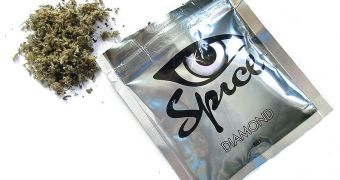Scientists from the University of South Florida (USF) discovered in a new study that otherwise-healthy, young adults have a higher chance of suffering strokes if they smoke synthetic marijuana. This is just the latest entry on a long list of side-effects associated with such surrogate substances.
Synthetic marijuana is known as spice or K2, and was developed to mimic the effects of real cannabis. However, over the years, scientists have found that smoking this type of pot leads to a number of medical disorders, including heart attacks, hallucinations, psychosis, seizures and heart diseases.
Now, the USF team has determined that K2 also increases the risk of stroke. Interestingly, a number of recent studies suggest that the same effect may be caused by natural, non-synthetic marijuana as well.
Neurologists at the university published details of the new research in the latest early online issue of the esteemed medical journal Neurology. The paper suggests that spice can lead to ischemic stokes, which occur when an artery in the brain becomes blocked, depriving areas of the cortex of blood.
The work was conducted on two individuals who were siblings, and who had consumed spice before suffering strokes. “Since the two patients were siblings, we wondered whether they might have any undiagnosed genetic conditions that predisposed them to strokes at a young age,” says W. Scott Burgin.
The expert, who was the senior author of the paper, holds an appointment as a professor of neurology at the USF Health Morsani College of Medicine. He is also the director of the Tampa General Hospital Comprehensive Stroke Center, Science Blog reports.
“To the best of our knowledge, what appeared to be heart-derived strokes occurred in two people with otherwise healthy hearts. So more study is needed,” Burgin adds. He conducted the work with lead author Melissa Freeman, MD, who is a vascular neurology fellow at the university.
K2 is produced by spraying a mixture of herbs with chemicals designed to replicate the actions of tetrahidrocannabinol (THC) on the cannabinoid receptors in the human brain. However, the psychoactive ingredients in the street version of the drug interact with the brain more severely.
“You don’t know what you’re getting when you smoke synthetic marijuana. It’s like the Wild West of pharmaceuticals, and you may be playing dangerously with your brain and your health,” Burgin concludes.

 14 DAY TRIAL //
14 DAY TRIAL //